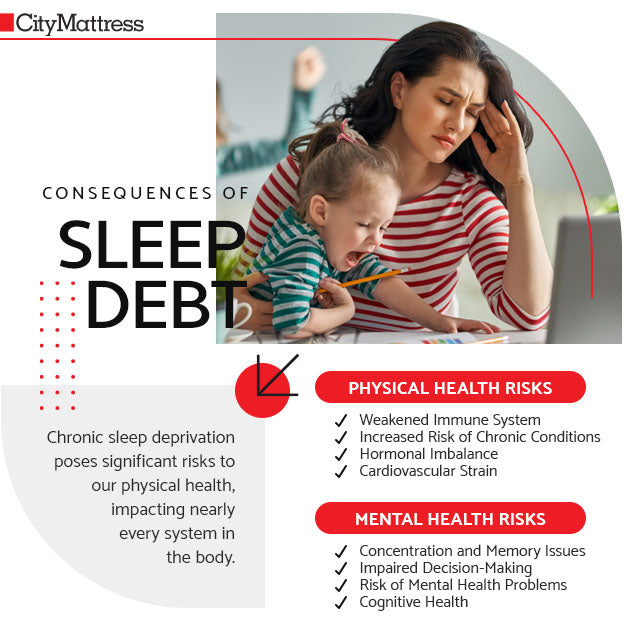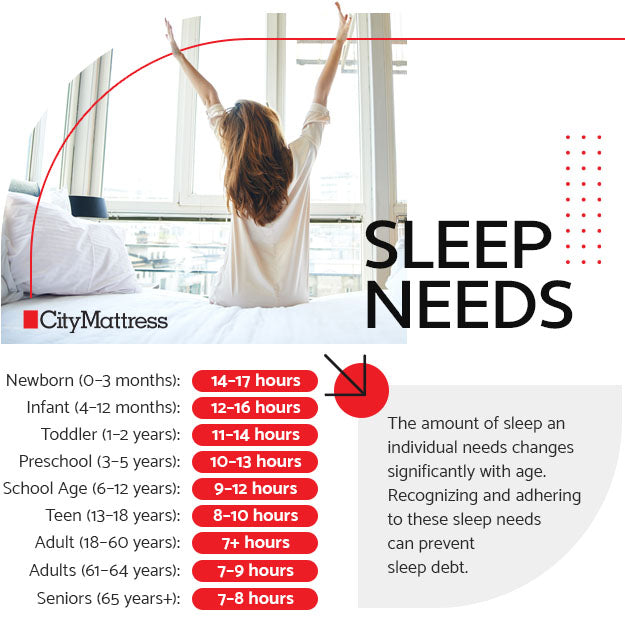
Did you know that losing just one hour of sleep per night can lead to a full night’s sleep debt in just a week? Sleep debt is the difference between the amount of sleep you need and the amount you actually get. It’s a cumulative issue that can affect your physical health, cognitive performance and emotional well-being if not addressed.
Rest assured that there is a solution. Together, we’ll examine the impact of sleep debt on health and offer practical strategies for managing and recovering from it. We’ll explore why sleep is essential, how sleep debt accumulates and the consequences of neglecting our sleep needs. Additionally, we provide insights on measuring sleep debt, strategies for repayment and tips for preventing it from building up in the first place. Whether you’re struggling with sleep debt or looking to improve your sleep health, this guide offers valuable information to help you understand and tackle sleep debt effectively.
Understanding Sleep Debt
Biological Need for Sleep
Sleep is both a period of rest and an essential biological need that affects our physical health, cognitive function and emotional well-being. During sleep, our bodies repair tissue, our brains consolidate memories and various systems rejuvenate to ensure we’re at our best. Without adequate sleep, every aspect of our health can suffer, highlighting the importance of prioritizing sleep to maintain balance and overall wellness. Since sleep serves as the foundation of good health and well-being, it plays a main role in brain function, emotional regulation and physical health:
Brain Function: Adequate sleep is necessary for cognitive processes. It enhances memory, improves concentration and supports overall mental agility.
Emotional Regulation: Sleep helps manage emotions and stress. A good night’s rest can improve mood and reduce anxiety, contributing to better emotional health.
Physical Health: Consistent, quality sleep is essential for the immune system. It aids in tissue repair, fights infection and supports heart health.
Neglecting sleep can compromise these critical functions, emphasizing the need for regular, restorative rest.
Shop All of Our MattressesHow Sleep Debt Accumulates
Sleep debt begins to accumulate when we consistently fail to meet our nightly sleep requirements, even by small margins. Each missed hour of sleep adds to the debt, much like borrowing from a lender. Over time, this debt grows if not addressed. This accumulation is subtle and can often go unnoticed until the debt becomes significant, affecting our health, mood and cognitive abilities. It’s a gradual process that underscores the importance of consistent, quality sleep.Reasons for accumulating sleep debt include:

Short Sleep Duration: Not achieving the recommended hours of sleep regularly contributes significantly to sleep debt.
Work or School Obligations: Extended hours dedicated to professional or academic responsibilities often encroach on sleep time, leading to accumulated sleep debt.
Lifestyle Choices: Activities such as late-night social events, binge-watching series or prolonged use of electronic devices disrupt sleep schedules and contribute to sleep debt.
Erratic Sleep Patterns: Frequently changing sleep schedules or trying to catch up on sleep during weekends can disrupt the body’s internal clock, making quality rest elusive.
Stress and Anxiety: High levels of stress and worry can lead to difficulty falling asleep or staying asleep, further contributing to the accrual of sleep debt.
Health Conditions: Certain medical conditions, such as insomnia or sleep apnea, can interfere with the ability to get sufficient sleep, leading to ongoing sleep debt.
Symptoms and Signs
The symptoms of sleep debt can be both subtle and overt, ranging from daytime fatigue and irritability to difficulty concentrating and decreased performance at work or school. Other signs include a reliance on caffeine to get through the day, mood swings and a general feeling of not being well-rested despite spending adequate time in bed. Recognizing these symptoms is the first step in addressing sleep debt and restoring a healthy sleep balance. Here’s a look at the most common signs and symptoms of sleep debt:
Daytime Fatigue: Persistent tiredness, regardless of activities or caffeine intake, indicating insufficient rest.
Lack of Focus and Efficiency: Struggling with attention and productivity, which can affect job performance and daily tasks.
Weakened Immune System: More frequent colds or infections, showing that the body’s defenses are compromised.
Cognitive Impairment: Challenges in learning, memory retention and decision-making due to inadequate rest.
Changes in Sleep Patterns: Experiencing disruptions like easily falling asleep during quiet moments, extended weekend sleep and reliance on naps.
Physical Effects: Noticing poorer physical coordination and an increased appetite for sugary or high-fat foods as the body seeks energy compensation.
Emotional Instability: Experiencing heightened emotional reactions or mood swings, which can strain personal and professional relationships.

Consequences of Sleep Debt
Physical Health Risks
Chronic sleep deprivation poses significant risks to our physical health, impacting nearly every system in the body.
Weakened Immune System: Lack of sleep compromises the body’s defense against infections, making it easier to fall ill.
Increased Risk of Chronic Conditions: Sleep debt is associated with higher chances of developing heart disease, diabetes and obesity due to disrupted physiological processes.
Hormonal Imbalance: Adequate sleep is necessary to regulate hormones that control appetite, stress and growth, highlighting the role of rest in hormonal health.
Cardiovascular Strain: The heart and blood vessels require sleep for repair and maintenance, underscoring sleep’s importance in preventing cardiovascular diseases.
Get Better Rest with Sleep AccessoriesMental and Cognitive Effects
Sleep debt doesn’t just wear down the body — it also impairs mental health and cognitive function.
Concentration and Memory Issues: Insufficient sleep impairs the ability to focus, remember and process information, affecting day-to-day functioning.
Impaired Decision-Making: Sleep deprivation negatively affects decision-making skills, leading to poorer choices and increased risk-taking.
Risk of Mental Health Problems: Chronic lack of sleep can increase the likelihood of developing conditions like anxiety and depression, underscoring the need for adequate rest.
Cognitive Health: Sufficient sleep supports mental clarity, emotional stability and cognitive function, emphasizing its importance for psychological well-being.
Measuring Sleep Debt

Sleep Needs
The amount of sleep an individual needs changes significantly with age, impacting overall health and well-being. Recognizing and adhering to these sleep recommendations can prevent sleep debt and promote optimal functioning.
Newborn (0–3 months): 14–17 hours
Infant (4–12 months): 12–16 hours per 24 hours, including naps
Toddler (1–2 years): 11–14 hours per 24 hours, including naps
Preschool (3–5 years): 10–13 hours per 24 hours, including naps
School Age (6–12 years): 9–12 hours per 24 hours
Teen (13–18 years): 8–10 hours per 24 hours
Adult (18–60 years): 7 or more hours per night
Older Adults (61–64 years): 7–9 hours
Seniors (65 years and older): 7–8 hours
Assessment Methods
To assess sleep debt, you can monitor your sleep patterns and compare them against the recommended sleep duration for your age group. Keeping a sleep diary or using a sleep tracker can help identify consistent patterns of sleep deprivation. Paying attention to how you feel during the day, such as feelings of drowsiness or difficulty concentrating, can also be indicative of accumulated sleep debt. Regularly assessing your sleep can highlight discrepancies and guide you toward achieving better sleep habits.
Managing, Recovering From and Preventing Sleep Debt
Strategies for Management and Repayment
A common misconception about sleep debt is the belief that sleeping in on weekends can completely reverse the negative effects of sleep deprivation accumulated during the week. While extra sleep can alleviate some immediate symptoms of sleep debt, it does not address the long-term impact on health and cognitive function. Consistent, quality sleep on a regular basis is essential for effectively managing and recovering from sleep debt, highlighting the importance of a sustained, healthy sleep schedule.
So we can see that effectively reducing sleep debt involves more than just sleeping longer hours — it requires a strategic approach to adjusting sleep schedules and enhancing sleep hygiene. Gradually going to bed earlier, maintaining a consistent wake-up time and creating a restful sleeping environment can significantly help. Additionally, limiting caffeine and screen time before bed, as well as incorporating relaxation techniques into your nighttime routine, are key steps in improving sleep quality and repaying sleep debt.

Lifestyle Changes
Adopting certain lifestyle adjustments is crucial in preventing the accumulation of sleep debt. Prioritizing sleep as a non-negotiable part of your daily routine, setting a consistent sleep schedule and creating a relaxing bedtime routine are essential steps. Additionally, exercising regularly and monitoring your intake of caffeine and large meals before bedtime can greatly contribute to achieving better sleep quality and preventing sleep debt. Here’s a closer look at some tips and strategies:
Regular Exercise: Incorporating daily physical activity can significantly improve sleep quality, helping to regulate your sleep cycle. Exercise enhances overall health, making it easier to fall asleep and stay asleep.
Limit Screen Time: Reducing exposure to screens before bedtime minimizes blue light exposure, which can disrupt sleep patterns. Consider reading a book or practicing relaxation techniques instead.
Moderate Caffeine Intake: Avoid consuming caffeine in the late afternoon or evening to prevent sleep disturbances. Opt for herbal tea or water to ensure a more restful night.
Avoid Alcohol Before Bed: While alcohol may initially induce drowsiness, it ultimately disrupts the sleep cycle, particularly affecting deep sleep vs. rem stages, leading to poorer sleep quality.
Manage Stress: Addressing daily stressors through mindfulness, meditation or journaling can improve sleep quality by reducing anxiety and promoting relaxation.
Consistent Sleep Schedule: Sticking to a regular sleep schedule, even on weekends, helps maintain your body’s internal clock, facilitating easier sleep onset and wake-up times.
Gradual Adjustment: If adjusting to a new sleep schedule, do so gradually by shifting your bedtime in 15-minute increments to allow your body to adapt without significant shock.

Sleep Hygiene Tips
Improving sleep quality and quantity is achievable through practical sleep hygiene tips. Ensure your sleeping environment is conducive to rest by keeping it cool, quiet and dark. Investing in a comfortable mattress and pillows can also make a significant difference. Establish a pre-sleep routine that includes winding down activities such as reading or meditating to signal to your body that it's time to sleep. Minimizing screen time before bed is also critical, as the blue light emitted by devices can disrupt your natural sleep cycle. Here are actionable suggestions to help:
Set Sleep Schedule: Consistency is key. Going to bed and waking up at the same time daily reinforces your body’s sleep-wake cycle, promoting better sleep.
Create a Bedtime Routine: A relaxing routine before bed, such as reading or taking a warm bath, can signal to your body that it’s time to wind down.
Optimize Bedroom Environment: Ensure your bedroom is ideal for sleep by keeping it dark, quiet and at a comfortable temperature. This environment is conducive to uninterrupted rest.
Comfortable Bedding: Investing in a comfortable Nectar mattress or similar brand with quality bedding comforters can make a significant difference in sleep quality by providing the support and comfort needed for a restful night.
Limit Naps: While napping can be beneficial, long or late-day naps can interfere with nighttime sleep. Keep naps short and early in the day.
Avoid Stimulants: Eliminate evening consumption of stimulants such as nicotine and caffeine to avoid sleep disruptions.
Light Evening Meals: Eating heavy or large meals before bed can lead to discomfort and indigestion, making it harder to fall asleep.
Sleep Diary: Tracking sleep patterns and behaviors can identify habits that are beneficial or detrimental to sleep quality, allowing for targeted improvements.
Avoid Exercise Before Bed: Engaging in vigorous exercise too close to bedtime can energize the body, making it difficult to relax and fall asleep.
When to Seek Professional Help
While implementing lifestyle changes and sleep hygiene practices can mitigate sleep debt, persistent sleep issues may indicate a more serious sleep disorder. If you find your sleep debt continues despite efforts to address it, or if you experience symptoms like excessive daytime sleepiness, loud snoring or pauses in breathing during sleep, it’s important to consult a healthcare professional. Early intervention can help identify underlying conditions such as sleep apnea or insomnia and provide appropriate treatment options.

Final Thoughts: Reclaim Your Rest, Transform Your Life
Exploring sleep debt reveals its significant impact on health and well-being, emphasizing the importance of consistent, quality sleep. Addressing sleep debt goes beyond merely catching up on missed hours; it involves making sleep a priority through a regular schedule, optimizing sleep environments and adopting healthy lifestyle habits. These strategies not only alleviate sleep debt but also enhance overall life quality by improving physical health, mental clarity and emotional stability.
Let this be a call to action: prioritize your sleep and recognize its essential role in your daily life. Small adjustments to your bedtime routine and seeking professional advice when necessary can lead to substantial improvements in your well-being. Embrace the restorative power of sleep and make it a non-negotiable part of your health regimen. Start tonight, and witness the positive changes that come from prioritizing rest.
Image Credits
Nenad Aksic/Shutterstock.com
Yuganov Konstantin/Shutterstock.com
Andrey_Popov/Shutterstock.com
fizkes/Shutterstock.com
PeopleImages/Shutterstock.com
G-Stock Studio/Shutterstock.com










